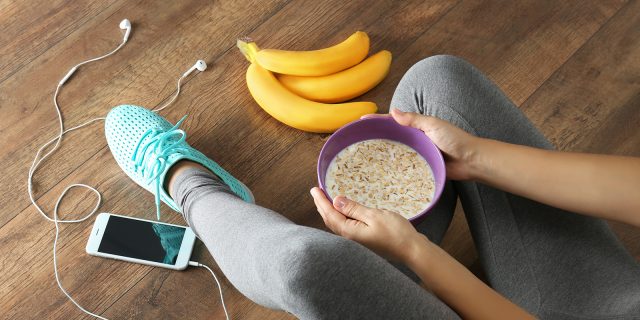
15 Things You Should Know About Your Metabolism To Keep You In Shape
0
You can boost your metabolism with water, spices, and a ten-minute workout.
1. You spend the most calories simply to maintain life
There is such a thing as the basic rate of metabolism or resting metabolism (resting metabolic rate, RMR). This is the number of calories that the body uses for all the chemical processes necessary for life.
In other words, basal metabolism is the energy that we spend when we do nothing at all – we do not move or even digest food.
And in most sedentary people, basal metabolism accounts for 65-70% of all daily energy expenditure. Only the remaining 30-35% is accounted for by physical activity and food digestion.
2. Your metabolic rate largely depends on genetics
Studies of siblings and twins have shown that metabolism is 40-45% determined by genetics. The same goes for the thermic effect of carbohydrates: how much energy you use to digest food is 40-50% dependent on your DNA profile.
Even how many calories you burn during exercise depends in part on your genes. However, only when working at a low power.
This explains why not all people are equally good at losing weight and gaining muscle mass on certain diets. Everything is individual and you will have to try to find your ideal mode.
3. Metabolism slows down with age and how to avoid it
The rate of metabolism in adults gradually decreases. Starting from the age of 18-19, you spend less and less energy every year. A sharp decrease in metabolism occurs after 30, then there is a small rise at the age of 50-59, followed by a gradual decline until the very end.
This is one of the reasons why it becomes more difficult to maintain a normal weight and get rid of extra pounds over the years kilograms.
But there is also good news: such a decline can be avoided.
In one study, Regular exercise and the age-related decline in resting metabolic rate in women, the metabolic rate of women of different age groups was checked: 21-35 years and 50-72 years. In inactive young and old people, the difference between the metabolic rate differed by about 10%. However, no such difference was found in long-distance runners and swimmers.
Although the study was conducted only on women, scientists believe that regular endurance sports will help avoid age-related changes in people of both sexes. An excellent excuse to finally run or sign up for a pool.
4. The more muscles, the faster the metabolism
Skeletal muscles make up 45-55% of body weight and make the largest contribution to energy expenditure, especially during physical activity.
Therefore, despite their large body weight, obese people have a lower resting metabolism than those of a normal weight.
The more muscles you can pump, the more energy the body will spend to maintain them. . Therefore, metabolism at rest will also increase.
5. Calculators can be wrong
There are various formulas used to calculate basal metabolic rate, but none of them give an accurate idea of how much energy you actually burn and how many calories you need to consume to maintain or lose weight.
The Mifflin-San Geor and Harris-Benedict equations are considered the most reliable, but they give errors.
The average deviation according to common formulas is from 314 to 445 kcal per day. In fact, this is a complete meal.
In addition, the more muscle mass a person has, the more wrong the formulas are, underestimating energy needs.
< p>When the accuracy of the calculations was tested on young athletes, it turned out that the most reliable equations underestimate the daily need for calories by 284 kcal in women (23% fat) and by 110 kcal in men (15% fat).
6 . Lack of sleep accelerates the metabolism, but it does not help to lose weight
During a night's rest, energy expenditure is reduced, so the less you sleep, the more calories you burn during the day.
One study found that people who slept for 5 hours burned 5% more calories per day. day than those who sleep 9 hours. In another experiment, it was found that 24 hours without sleep increases energy expenditure by an average of 7% per day.
However, along with the activation of calorie consumption, the appetite also increases, as well as the desire for fatty and sweet food. So if you do not control your diet, then after a bad night you will quickly cover the additional energy expenditure with snacks.
7. Stress doesn't lower metabolism, but it can lead to weight gain
A recent study showed that psychological stress and anxiety levels have no effect on resting metabolism.
However, chronic stress can still lead to gaining extra pounds. Constant anxiety changes the concentration of hunger and satiety hormones, forcing you to eat more than you need and insist on high-calorie food.
In addition, stress reduces the body's ability to oxidize fats and use up energy after eating a fatty meal.
If you were nervous , in the next six hours you will burn about 104 kcal less than if everything were fine. Scientists have calculated that daily stress can result in an increase of 5 kg per year.
8. Strict diets slow down the metabolism
When you drastically reduce the calorie intake of your diet and lose weight, the body goes into energy-saving mode: the basal metabolism slows down and may remain so even after you restore the normal calorie intake. And a number of studies back this up.
Slowing metabolism is partly due to the loss of muscle mass that goes along with fat if nothing is done to preserve it. When you go back to your usual diet, the weight is quickly gained. Fortunately, this can be avoided if you choose the right diet.
9. A large amount of protein accelerates metabolism even on a diet
The body needs to spend much more energy to absorb dietary protein than to process carbohydrates and fats.
About 20-30% of the calories you get from protein will be absorbed.
Due to this effect, protein increases energy expenditure at rest, helping to maintain a normal weight. Moreover, a high protein intake helps to preserve and even increase muscle mass on a diet and thus avoid a slowdown in metabolism.
10. Exercise increases resting metabolism even when dieting
Physical activity not only increases energy expenditure throughout the day, but also affects the level of resting metabolism, increasing it even in conditions of calorie deficit.
And power loads cope best with this. They not only increase the effect of metabolism at rest and during sleep, but also help maintain and build muscle mass.
11. Exercising too hard can slow your metabolism
Both aerobic and strength exercises are equally good at maintaining basal metabolic rates, but if the activity becomes exhausting, the opposite happens.
Observation of experienced cyclists has shown that that in the period of heavy loads – up to 150% of the usual intensity of training – energy consumption at rest is significantly reduced.
12. Spices can increase metabolism
Some spices activate thermogenesis during food digestion, causing the body to burn more calories. These include ginger, pepper and chili.
Add these spices to food and drinks and you can spend an additional 40-50 kcal per day. Moreover, ginger and chili pepper have anti-inflammatory and anti-tumor properties, which can have a positive effect on overall health.
13. Ten minutes of physical activity can speed up metabolism
This applies to high-intensity interval training (HIIT) – alternating short periods of high intensity with intervals of rest or restorative activity. For example, 20 seconds of sprinting and 10 seconds of jogging.
Due to the high intensity of VIIT, more calories are spent than the same time of quiet work, excellent endurance and speed up metabolism at rest.
14. Coffee and tea increase metabolism
The two most common beverages help burn more calories due to their caffeine content, a substance that stimulates the central nervous system.
One cup of brewed coffee (about 250 ml, 100 mg of caffeine) increases energy expenditure by 9.2 kcal per hour within the next three hours after taking.
Green tea also contains caffeine, as well as catechins – substances that have antioxidant properties. Together, they increase thermogenesis and help avoid metabolic slowdown even on low-calorie diets.
15. Cold water can increase metabolism
Some studies confirm that plain water can activate energy expenditure at rest.
For example, in the scientific work of Michael Boschmann (Michael Boschmann) with the participation of 14 healthy men and of women without excess weight found that 500 ml of cool water (22 °C) increased the participants' metabolism by 30%.
People burned calories at an accelerated rate already 10 minutes after drinking, and after 30-40 minutes the effect was completely off the charts. Scientists have calculated that after drinking 2 liters of water a day, a person can burn an additional 95 kcal.
Three years later, Clive M. Brown conducted a similar experiment with the participation of eight young, healthy representatives of both sexes and obtained far not so optimistic results.
In his study, about 500 ml of cold water (3 °C) increased the metabolism of the subjects by only 4.5% within an hour after drinking. Brown concluded that this was not enough to help with weight loss.
In addition, the scientist noted that Boschmann's work used direct calorimetry in a special chamber, and not an apparatus for indirect respiratory calorimetry, which is worn on the participant's head in the form of a dome or mask.
Maybe Boschmann really measured incorrectly, and twice (in 2007, he again conducted an experiment in a respiratory chamber and obtained 24% after 500 ml of cold water). But in 2011, another work was published in which the consumption of calories in obese children was checked.
Here, as in Brown's experiment, an indirect calorimeter was used, but the results were similar to those obtained by Boschmann . Within 40 minutes after taking 10 ml of cold water (4 °C) per kilogram of body weight, the level of resting metabolism increased by 25% in children.
It is difficult to draw unequivocal conclusions, since the results are different and the topic needs further research. But if you want to lose weight, a couple of liters of cool water a day, spread over several meals, can do the trick.









Leave a Reply